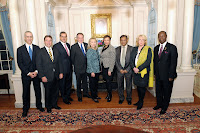The Climate and Clean Air Coalition to Reduce Short-Term Climate Pollutants was launched in Washington DC on 17 February 2012. The Coalition is one of the most important developments to combat climate change in over a decade. The coalition is focused on fast-action climate mitigation which has the potential to reduce a major part of climate pollution and build the momentum to successfully manage carbon dioxide from energy production.
Aims of the Coalition
- To catalyze the speed and the scale of action on short lived climate pollutants
- Enhance existing and develop new national actions to address mitigation gaps
- Encourage existing and new regional actions
- Reinforce and track existing efforts to reduce these pollutants, promoting opportunities for greater international coordination and developing and improving inventories
- Identify barriers to action and seeking to surmount them
- Promote best practices or available technologies and showcase successful efforts to address short lived climate forcers
- Improve understanding of and review scientific progress on short lived climate pollutants, their impacts and benefits of mitigation and dissemination of knowledge; and
- Mobilize targeted support for those developing countries that require resources to develop their capacity and to implement actions consistent with national strategies to support sustainable development
The war against climate change just got major reinforcements in the effort to reduce black carbon (soot), methane, and hydrofluorocarbons (HFCs), collectively known as short-lived climate pollutants because they remain in the air to warm the Earth for only a few days to a decade and a half.
Reducing them can cut the rate of global warming by half or more for the next 30 to 40 years, providing critical protection for the Arctic, Himalayas, and other vulnerable regions, while saving millions of lives a year and reducing crop damage, providing a substantial boost for development.
The European Union, Norway, Japan, Nigeria, Colombia, and the World Bank announced today that they have joined the Coalition for Climate and Clean Air to Reduce Short-lived Climate Pollutants, launched in February by three developing (Mexico, Ghana, and Bangladesh) and three developed countries (Sweden, US, and Canada), along with the United Nations Environment Programme.
The Coalition concluded its inaugural Ministerial meeting today in Stockholm. Many other countries are poised to join shortly. Initial funding for the Coalition has been provided by the US and Canada. Sweden and Norway announced today that they would contribute as well. The World Bank announced they have $12 billion in their portfolio that can contribute to the Coalition goals, and noted the need for urgent action to reduce the short-lived climate pollutants.
Durwood Zaelke, President of the Institute for Governance & Sustainable Development, who attended the inaugural meeting in Stockholm, stated,
“The Coalition may be the single most important development for climate protection in the past ten years. It focuses on fast-action climate mitigation that can be done today with existing technologies by willing partners. It has the potential not only to reduce a major part of climate pollution, but to build the momentum and confidence we need to successfully manage carbon dioxide from energy production, which is essential for keeping the Planet’s long term temperature increase to an acceptable level.”
Many scientists calculate that global temperature cannot increase more than 2°C above pre-Industrial levels without risking major and perhaps catastrophic climate impacts, including devastating sea-level rise and punishing storm surges, as well as droughts, floods, and other extreme weather events. Major cuts in carbon dioxide are essential to stay below 2°C in the longer term, along with cuts to the short-lived climate pollutants.
Zaelke said,
“To win the climate war, we need to cut both the short-lived climate pollutants and long-lived carbon dioxide, the most damaging gas. Fortunately, we’re gaining allies quickly in the second front of the fight against black carbon, methane, and HFCs. A victory on this front will build the confidence we need to win the war.”
The short-lived climate pollutants are responsible for 40 to 45% of all warming, with carbon dioxide, a substantial portion of which remains in the air for millennia, responsible for the other 55-60%.
To see the Coalition's reports on HFCs click here, on black carbon click here. For More Information Contact Nick Nuttall, Acting Director UNEP Division of Communications and Public Information/UNEP Spokesperson, on Tel: +254 733 632755, E-mail: nick.nuttall@unep.org
© 2012, Richard Matthews. All rights reserved.
New Partners of the Climate and Clean Air Coalition
Six Initiatives from the Climate and Clean Air Coalition

0 comments:
Post a Comment